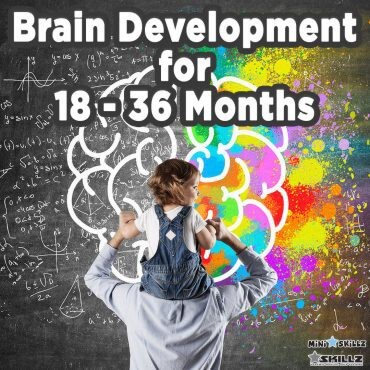Brain development in children aged 18-36 months
 Healthy brain development is one of the most important aspects of childhood development. More specifically, the first few years of life are a significant period as synaptic connections are at their highest. This is a time when positive and nurturing experiences are essential for the brain to form the strong connections that underpin learning. By understanding the importance of early synaptic connections, parents realized that it was worthwhile for their children to participate in enrichment programs such as Mini SKILLZ to assist with this development.
Healthy brain development is one of the most important aspects of childhood development. More specifically, the first few years of life are a significant period as synaptic connections are at their highest. This is a time when positive and nurturing experiences are essential for the brain to form the strong connections that underpin learning. By understanding the importance of early synaptic connections, parents realized that it was worthwhile for their children to participate in enrichment programs such as Mini SKILLZ to assist with this development.
Synapses are connections between neurons that transmit signals to each other in the brain. At about 2 to 3 years of age, synaptic formation is at its highest point. Then the synaptic trimming process begins and unnecessary connections in the brain are removed. It is an essential part of brain development as it strengthens the more important synapses by eliminating unused connections. In this way, the brain becomes more efficient to learn more complex information as it develops.
The process of synaptic pruning is largely based on the child’s experience. According to the research paper “Brain Development and the Role of Experience in the Early Years,” Harvard researchers Adrienne Tierney and Charles Nelson found that “early childhood experiences influence the development of brain architecture in ways that later experiences do not.” For this reason, nurturing positive emotions during this process is important for children to better understand and remember the learning experience.
During the peak years of synaptic connections, there is a time when babies should be brought into an environment that strengthens them. According to the Harvard Center on the Developing Child, “The emotional and physical health, social skills, and cognitive-language skills that emerge early in life are important prerequisites for success in school and later in the workplace and community.” Understanding this, Melody Johnson created the Mini SKILLZ program for children aged 18 to 36 months. This powerful play environment is the basis for the development of healthy brain structures.
It should be noted, however, that negative experiences in these early years also affect connections in the brain. Stress and deprivation can lead to what Tierney and Nelson refer to as “brain circuit mismatching” and cause the synapses associated with these negative experiences to become stronger, and later to cause behavioral problems. Therefore, it is very important for children to experience caring and positive interactions with their parents and other caregivers and important adults in their lives. The more positive the experiences, the more these connections will be strengthened and the more negative synapses will be removed.
As the Mini SKILLZ framework includes research in science, psychology and child development, the curriculum has a significant impact on participating children. This impact is even more significant as it implements the Parent SKILLZ parenting skills program and uses a child-caregiver relationship which fosters positive interactions. Therefore, this program creates an atmosphere for healthy brain development.
Positive environments favor healthy brain development. Constant positive stimulation in the early years helps synapses grow and become permanent. Once formed, they can either be strengthened or weakened. Therefore, it is important to nurture positive experiences in the first years. One of the best ways to do this is by participating in an enrichment program that supports your child’s entire development.



